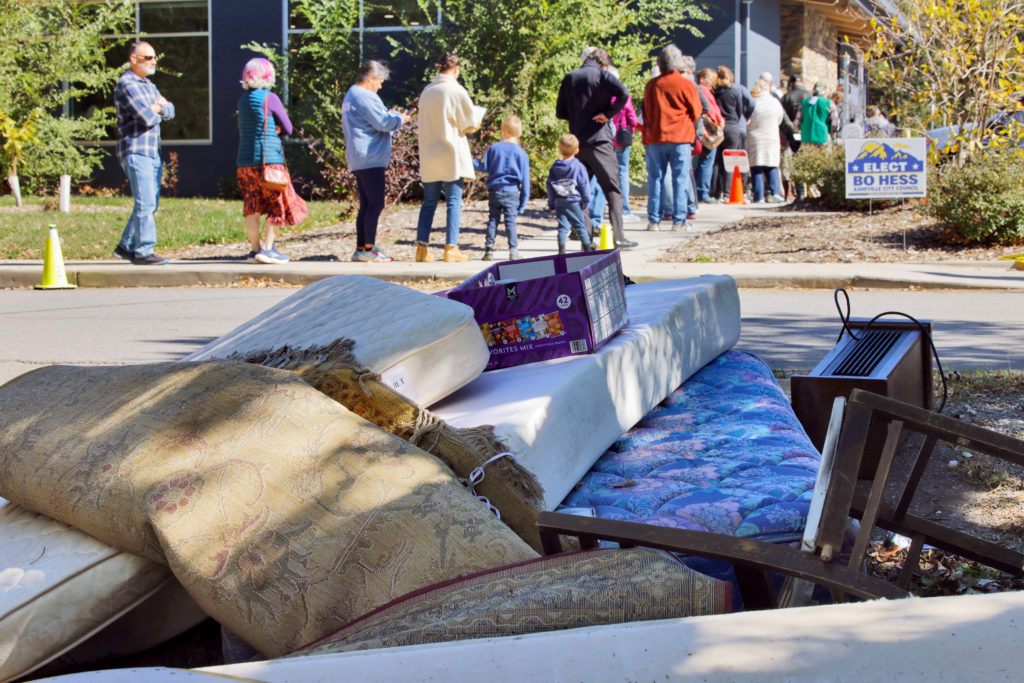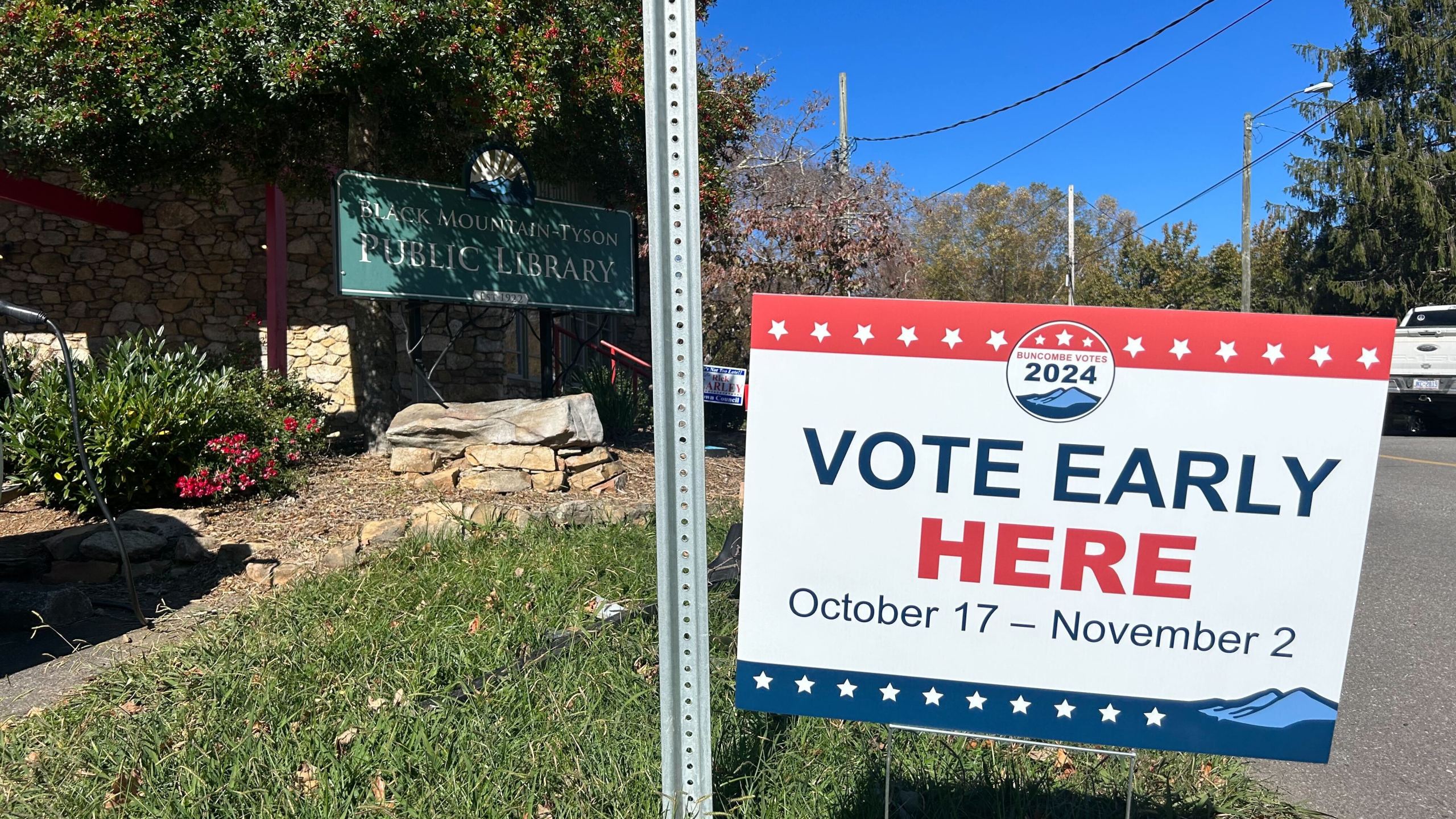Table of Contents
North Carolina Early Wasn’t Affected By Helene’s Impact
Approximately three weeks following Hurricane Helene’s impact on western North Carolina, the Hot Springs Community Center remained covered in mud. A notice on the door asked visitors to be very careful until the building was checked. The cause of the damage was written at the top of the page: water flooding.
Similar to numerous other structures in the small town with a population of around 500 residents, the flood caused severe damage to the center. One of several issues faced by election officials in Madison County was the inability to use the center for early voting, which was part of their original plan to have three locations available.
Locating a suitable location for the voting machines, free from damage with ample space and power supply, was just one of the many challenges faced by elections officials, poll workers, and voters in the aftermath of Helene’s devastation.
Officials chose the Hot Springs Senior Meal Site as the new early voting location for the town. Dean Benfield, who has worked as a poll worker for more than 20 years, has had to make a significant adaptation. Her and her coworkers used to have a regular schedule at the local center, which was currently interrupted, similar to many of their neighbors’ lives.
“I hated that that was destroyed,” Benfield, 77, talked about the community center she had been going to since she was a child.
Nevertheless, the voters arrived punctually for early voting last week when the polls opened. Benfield, in charge of the polling station, characterized it as a significant day, with over 50 voters ultimately voting.
“Normally on the first day, and I’m just gonna tell you, we might wind up with four voters, we might wind up with five for the whole day,” she said. “But this has been a good turnout.”
Voters show up in Unprecedented numbers
One small town saw a strong early voting turnout, showcasing the extraordinary preparation across storm-damaged counties in western North Carolina for the upcoming election in a key presidential battleground state.
Despite flooding displacing residents, communities being isolated by damaged roads, and services like power and internet being disrupted, state and local election officials are determined to help voters find a way to vote. Certain towns are still without water due to the complete destruction of their water systems.
The community center in Hot Springs ended up being one of the few early voting sites out of 80 in western North Carolina that couldn’t open due to the storm.
The level of participation in early voting since last week has been unexpectedly high. According to the North Carolina State Board of Elections, a statewide record of over 350,000 ballots were cast by voters on the first day. By Tuesday, over 1.3 million votes were cast through in-person and mailed ballots during the first six days of early voting.
Karen Brinson Bell, who serves as the executive director of the State Board of Elections, has consistently commended the dedication shown by local election workers, with some even experiencing the loss of their own residences. Describing the damage as unprecedented, she also referred to the challenges election officials encountered as daunting. During the initial week of early voting, the procedure has been incredibly efficient and there have been minimal public complaints.
“Mountain people are strong, and the election people who serve them are resilient and tough, too,” she said last week.
‘Flickers of optimism’
That doesn’t mean it has been simple. The Associated Press observed election workers and voters in Madison, a predominantly Republican county supporting Donald Trump, and Buncombe, a Democratic-leaning county in the hardest hit region home to Asheville, for two days at the start of early voting after Helene. It gave strong support to Hillary Clinton in 2016 and Joe Biden in 2020.
Several election workers discussed experiencing disturbances in their usual schedules. At times, they share building space with first responders or volunteers helping with hurricane relief efforts. They also need to adjust to new state election regulations aimed at enhancing voter access following the disaster.
One of the most common issues Madison County Elections Director Jacob Ray has had to deal with is the uncertainty surrounding the locations of polling places. Malfunctioning phones in the elections office have been an additional obstacle, complicating communication with voters.
However, Ray mentioned that things have been progressing smoothly in terms of getting the election back on schedule, despite the damage in downtown Hot Springs and Marshall, which are two of the primary towns in the county. “Are we going to even be able to have elections?”
He has since answered his own question and each day since the storm has seemed to get better.
“We’re starting to see more glimmers of hope,” he said.
Voting continues despite absence of power, water, and roads.
Recovery continues in both counties. Previously, main roads were obstructed by big trees, but now they run along the sides of the roads. Construction teams are always present, repairing severely damaged structures or resurfacing streets.

Clean water accessibility in Buncombe County continues to be a struggle following the destruction of key pipelines by Hurricane Helene. The impact of the destruction in and around Asheville on voter turnout for Election Day remains uncertain, but any decrease from past elections could particularly hurt Harris’ prospects in the state due to the county’s Democratic leaning.
Certain voters were resolute in casting their vote. They navigated around obstacles caused by roads in disrepair, extended power outages, and other disturbances in order to make their voices heard in what many called one of the most crucial presidential elections of their lifetime.
Last week, Susan and Stephen Miller’s residence in Buncombe County remained without electricity and water, and had developed black mold due to the flooding. The couple has been moving between rental homes for weeks since Helene’s arrival so Stephen could work from a different location.
Susan Miller mentioned that she was acquainted with individuals who had to trek from their residences due to the collapse of roads and bridges. The Millers had better luck, as they could travel to the Black Mountain Library for the start of early voting.
She was not shocked to see a queue of voters, describing Black Mountain as a vibrant community. Additionally, she observed the building’s warmth, providing a sanctuary from the cold for those without heating in their homes.
“I’m very pleased to see this many people. I was glad to wait, and I would have waited twice as long to be able to do this,” Stephen Miller commented following the couple’s voting for Harris.
Intent on submitting their vote
Diana and Richard Rockwell typically vote early as part of their tradition, but this year they had to go to a different polling location.
The voting location the couple typically used in Swannanoa, a town in Buncombe County near Black Mountain, was being utilized for recovery operations. After getting an email informing them about a polling place change, they decided to visit the Black Mountain Library instead.
The couple expressed their enthusiasm for voting despite the challenges faced by their community. After the storm, they assisted neighbors in contacting their family members.
“You get to know people and see how kind they are, and you might not have known that,” said Diana Rockwell.
The Rockwells, who are both Republicans, emphasized that their top priorities were abortion, immigration, and the economy.
Lynn Ferry had finished her mail-in ballot and went to the Black Mountain Library to submit it. While her home remained mostly unharmed, she experienced more than two weeks without internet and some roads close to her house were destroyed by flooding.
The landslides caused some roads to be closed, making her journey to the library more challenging and lengthier than usual.
Having to park a few blocks away from the library was only a slight inconvenience. She wanted to ensure her vote was received by the individuals responsible for tallying the votes, she explained.
“If I had to drive 20 hours in one direction to cast a vote, I would have done it,” Ferry said. “That’s how important it is for each of us to take responsibility for this country.”
Recent Post: Doctors Showed Concerns About Clock Shifting








